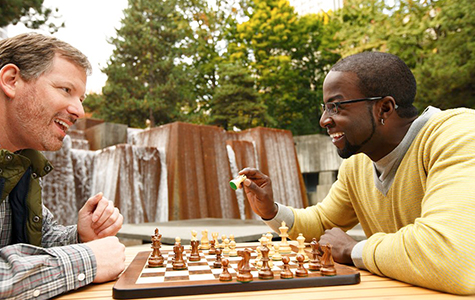Depression
Embrace the whole you.
Mental and physical well-being go hand-in-hand. Don’t let depression stop you from living life to its fullest.

What Is Depression?
Depression is an illness. It can cause intense emotional and physical symptoms. It affects your total health and well-being. If you’re struggling with depression, you may experience:
- Sadness or hopelessness that won’t go away
- Loss of interest in activities you’ve always enjoyed
- Physical signs like pain or feeling unusually tired
- Suicidal thoughts
Depression can be difficult to recognize–and hard to talk about. Find help. Find hope. Find your words.
Understanding Types Of Depression
- Ongoing depression
- Bipolar disorder
- Seasonal affective disorder (SAD)
- Post-traumatic stress disorder
Grief is not a type of depression, but its symptoms and treatment can be similar:
Is It More Than Depression?
Depression can happen alongside other issues and conditions, including:
- Illnesses like anxiety (an unusual level of worry or nervousness)
- A chronic condition, such as diabetes
- Physical, sexual, and/or domestic abuse
Learn more about anxiety, chronic illness, and other factors that may contribute to depression.
How Can I Find Out If I May Have Depression?
If you’re 18 or older, you can take this self-assessment quiz. You can also get more information on care and resources. This is not a substitute for talking with your doctor, who can help you with treatment.
Is Depression Simply A “Chemical Imbalance” In The Brain?
Depression is very complex. It involves brain chemicals like serotonin, brain cell connections, and much more. Understanding the science behind depression and its symptoms can often help those who suffer from it.
Watch this video to learn more about what happens in the brain during depression.
How Can I Help Myself?
Self-care can often make a big difference. If you’re struggling with depression:
- Use healthy thinking tools
- Learn how exercise can help
- Empower yourself with meditation
- Try some breathing relaxation exercises
- Use these health tools to help you make decisions or take action to improve your health
Try some apps developed by the Center for Behavioral Health Intervention Technologies, at Northwestern University’s Feinberg School of Medicine. They are free from Google Play, and include:
- The Hub, to find apps based on your goals and to track your progress
- Thought Challenger, to reinforce positive thoughts
- My Mantra, for encouraging and reassuring messages you create
- Day to Day, for daily messages to help you apply new skills
- Worry Not, to learn to change negatives feelings that come from worrying
- Daily Feats, to help you add productive activities into your day and celebrate your accomplishments
Kaiser Permanente members have access to digital mental health and wellness tools at no charge. Check out this page for apps. You also can call a health coach for subscriptions to SilverCloud, Woebot, or Thrive.

What If I Need Help Right Now?
If you feel like you can’t cope, life is very difficult, or your life isn’t worth living, get help now.
For quick attention:
- If you’re a Kaiser Permanente Northwest member, call Kaiser Permanente Behavioral Health Crisis at 503-331-6425 or 1-866-453-3932. It is available 24 hours a day, 7 days a week. Caring, experienced Kaiser Permanente team members will evaluate your situation and find the right care for you.
- Call the National Suicide Prevention Lifeline (available 24 hours a day). Local crisis workers will listen and help.
- 1-800-273-8255
- 1-800-799-4889 (TTY for hearing and speech impaired)
Depression And Abuse
People who live with abuse often struggle with depression. If someone is hurting you, tell your doctor or call the National Domestic Violence Hotline at 1-800-799-SAFE to get help.
Are There Any Other Ways I Can Get Help?
As you deal with your depression, a health coach can offer support along with coping strategies.
We encourage you to learn more about our health coaching sessions.
Looking For More?
If you’re a Kaiser Permanente Northwest member, you can discuss treatment needs or set up an appointment by calling the Kaiser Permanente Mental Health Department, 1-855-632-8280.
